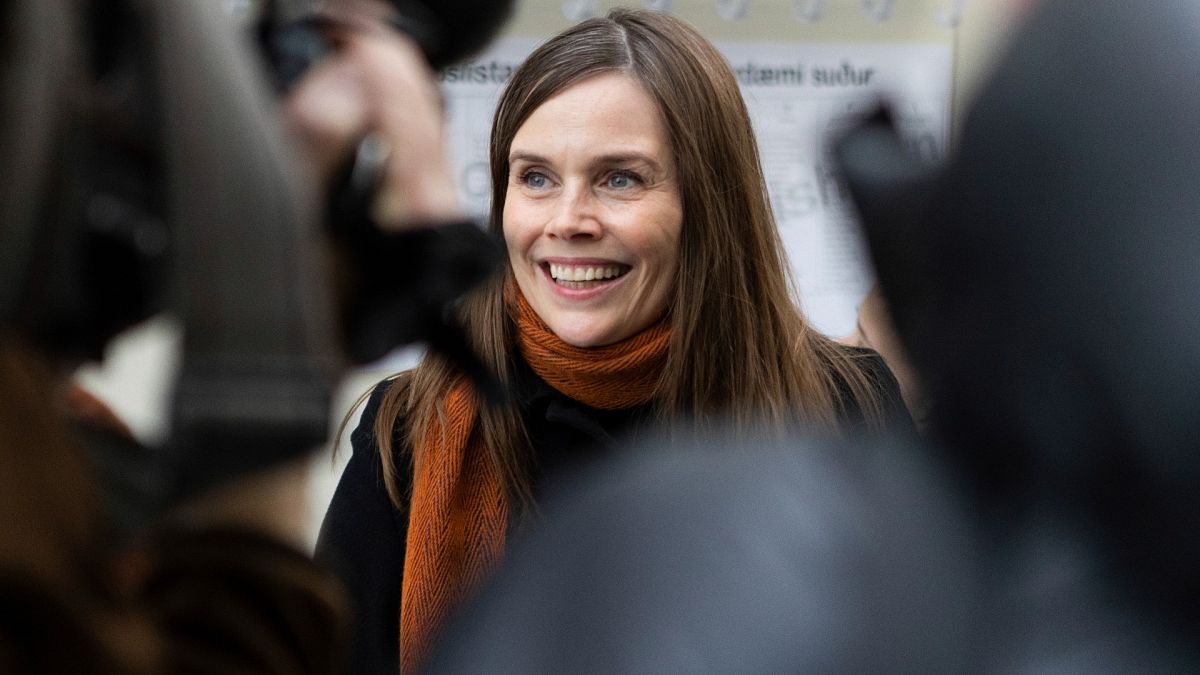The ruling parties won 37 seats altogether, gaining two from the last election.
Iceland’s coalition government appeared likely to continue after voters rallied around the political centre in a volatile parliamentary election.
Results from Saturday's vote showed the ruling coalition — led by the Left-Green Movement with the conservative Independence Party and the centre-right Progressive Party— expanded its majority from the 33 seats it won in 2017, to 37 seats.
Polls had suggested a victory for left-leaning parties in the unpredictable election, which saw 10 parties competing for Iceland’s 63-seat parliament, the Althing.
Instead, the centre-right Independence Party took the largest share of votes, and there were big gains for the centrist Progressive Party.
As per Icelandic custom, the ruling coalition parties will be the first to begin talks for the next government.
Speaking to reporters on Sunday morning, Independence Party chair and finance minister Bjarni Benediktsson cautioned that it was not a given that the ruling coalition would continue. It is also not a given that the Left-Greens will continue to hold the position of prime minister, currently held by party chair Katrín Jakobsdóttir. The Progressives may make a play for the top job, which would in that case be held by Progressive chair Sigurður Ingi Jóhannsson.
If not more of the same, then who?
In the event the current ruling coalition does not hold, the Independence Party and the Progressive Party have the pick of who they would like to form a new government with. Together, the two parties comprise 29 seats and need only an additional three to have a majority.
They could, in theory, choose to ask any party that won seats into the new partnership, including the Centre Party, who fared worst of all in these elections, having gone from seven seats to three.
As the Independence Party and the Progressive Party are in a similar place on the political spectrum, should they forgo continuing a government with the Left-Greens, they may opt to pick a centre-to-right party instead. The Reform Party, which gained a seat for a total of five on election night, is one contender — party chair Þorgerður Katrín Gunnarsdóttir was once herself an MP for the Independence Party. The People’s Party would be another strong choice, having gone from four seats in 2017 to six on Saturday, and is also chaired by a woman, Inga Sæland.
Rowing back on records
It was widely reported that Iceland had become the first parliament in Europe to have women comprise more than 50% of seats.
But a recount in the Northwest District early on Sunday morning changed the election results and saw that record fall.
There are now 33 men and 30 women in Iceland's parliament; before the recount, the opposite was the case.
Still, at almost 48% of the total, that is the highest percentage for women lawmakers in Europe.
According to data compiled by the World Bank, no country in Europe had ever passed the symbolic 50% mark. Sweden had come the closest with 47% female MPs.
In addition, Pirate Party candidate Lenya Rún Taha Karim was initially the youngest member of Parliament in Iceland’s history, and also the first member of Kurdish descent, but the recount bumped her out of the running, replaced instead by Gísli Rafn Ólafsson of the same party.
What will this mean for Iceland and for Europe?
The poor showing amongst left-of-centre parties has put some wind in the sails of Icelandic conservatives, and it is likely that they will hope to see their policies move forward. The health care system, a big issue amongst Icelandic voters, will likely be at the top of that agenda. While Iceland’s left has called for increased funding for public health as a way of combating staff shortages, conservatives — especially the Independence Party —have been keener on increased privatisation in the health care sector.
The issues of jobs and the economy, as tourism has been hard hit by the global pandemic, are also important issues for voters, and conservatives may opt for favouring the tourism industry more than pandemic restrictions; of important note is that the Ministry of Health, which has the final say on pandemic response, has been led by the Leftist-Greens.
The constitutional draft, formed in the wake of the 2008 financial crash, will most likely not be ratified, either, as conservatives have been staunchly opposed to constitutional reform.
For the rest of Europe, the chance for accession talks for joining the European Union are once again scuttled. The Social Democrats are decidedly pro-EU, and other parties have sought a national referendum on the question, but both the Independence Party and the Progressives have been very much against joining the EU; it was, in fact, a Progressive MP, then Minister of Foreign Affairs Gunnar Bragi Sveinsson, who abruptly ended accession talks in 2015.
The days, and even weeks, ahead of possible coalition talks will still determine whether Iceland’s government will remain the same, albeit with an even stronger majority, or go in a different direction altogether.
What about climate change?
Climate change had ranked high on the election agenda in Iceland, a glacier-studded volcanic island nation of about 350,000 people in the North Atlantic.
An exceptionally warm summer by Icelandic standards — with 59 days of temperatures above 20°C — and shrinking glaciers have helped drive global warming up the political agenda.
But that didn't appear to have translated into increased support for any of the four left-leaning parties that campaigned to cut carbon emissions by more than Iceland is committed to under the Paris Climate Agreement.


